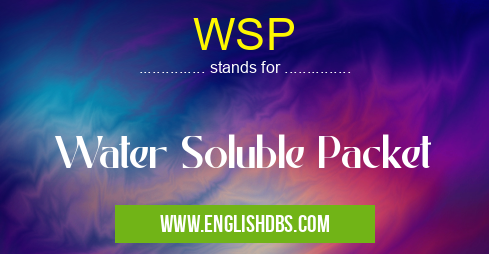What does WSP mean in CHEMISTRY
WSP stands for Water Soluble Packet which is a type of packaging used for chemicals and other substances. It’s a product that has been designed to dissolve quickly when it comes into contact with water. This type of packaging is useful for many different applications from preserving chemicals in a form that is easy to handle to delivering liquid or powdery substances directly into the water source. WSPs are particularly popular in industries such as agriculture, food production, pharmaceuticals and chemical manufacturing, where they can be used to pre-mix batches of ingredients that need to be dissolved prior to use.

WSP meaning in Chemistry in Academic & Science
WSP mostly used in an acronym Chemistry in Category Academic & Science that means Water Soluble Packet
Shorthand: WSP,
Full Form: Water Soluble Packet
For more information of "Water Soluble Packet", see the section below.
Definition
A Water Soluble Packet (WSP) is a pre-measured package that dissolves instantly when it contacts a liquid medium like water. These packets typically come in either plastic or non-plastic form and are designed for various uses depending on the content they contain and the end user’s needs. For example, if it contains a fertilizer, then it may be used as an instant feeding solution in agriculture; whereas if it contains powdered cleaning agents, then it may be used as an effective way of delivering detergents or other cleaning agents directly into the water source without having to manually measure out doses or add them separately.
Advantages
One of the major advantages of WSPs is their convenience in use. Pre-measured packages are much easier to transport and store than bulkier containers that require manual measurement when preparing compounds or mixtures. They also make delivery of certain substances much simpler as there’s no requirement for additional equipment such as pumps or carts needed when transporting larger volumes of materials. Additionally, since the packets dissolve instantly upon contact with the liquid medium, they can help reduce waste by eliminating the need to clean up any residue afterwards.
Disadvantages
Despite their advantages, WSPs do have some disadvantages worth noting too. Firstly, their pre-measured size often means that users don't have much flexibility regarding dosage amounts - leaving them unable to adjust concentrations according to specific needs or applications. Furthermore, some chemicals tend to react differently when dissolved in water compared with being added separately - potentially leading to inaccurate results or unpredictable outcomes if not addressed properly during formulation development and implementation processes. Finally, although most WSP types use biodegradable materials during manufacturing, some have been known to prove more difficult than others when decomposing due to their thicker construction design - something worth considering before choosing this type of packaging for certain products.
Essential Questions and Answers on Water Soluble Packet in "SCIENCE»CHEMISTRY"
What is a Water Soluble Packet?
A Water Soluble Packet, or WSP, is a packet of chemicals that can be dissolved in water to create an effective cleaning solution. These packets are typically used as a convenient and easy way to clean surfaces such as floors, walls, and windows.
How do Water Soluble Packets work?
The contents of the WSP dissolve easily in water, forming an effective cleaning solution which is then sprayed onto surfaces where dirt and grime have built up. The combination of the chemical ingredients and the water act on the dirt to break it down for easy removal.
Are Water Soluble Packets safe to use?
Yes, when used as directed they are generally safe for use on most indoor surfaces. Always read the instructions carefully before using a WSP to ensure that it is appropriate for your particular surface type and cleaning needs. It may be necessary to wear protective gloves or other safety equipment when handling these products.
How should I store my Water Soluble Packets?
You should always store your WSPs out of reach of children and pets, in a cool dry place away from direct sunlight or any sources of heat. Make sure that you keep the packets in their original packaging with all labels attached until ready for use.
What kind of surfaces can I clean with a Water Soluble Packet?
Generally speaking most common household hard surfaces can be cleaned using this product; however, always refer to the product label instructions before using a WSP on any surface type just to be sure that it is appropriate.
What's inside a Water Soluble Packet?
The exact contents of a WSP will depend on its intended purpose but usually consist of surfactants (detergent-like compounds), enzymes (protein molecules) and other cleaning chemicals specific to its purpose such as bleaching agents or degreasers.
Final Words:
In conclusion, Water Soluble Packets offer several benefits in terms of ease-of-use and convenience for various types of applications and industries where preservatives and dissolution solutions are required – especially those where significant volumes need transporting efficiently without losing accuracy regarding material doses. Despite this however, users should also consider potential drawbacks such as reduced flexibility over dosage amounts and potential issues related while decomposing more resilient plastics during disposal processes before making use of them – helping ensure smoother operation along the way.
WSP also stands for: |
|
| All stands for WSP |
